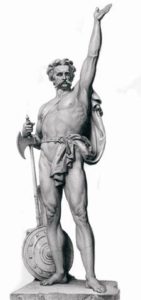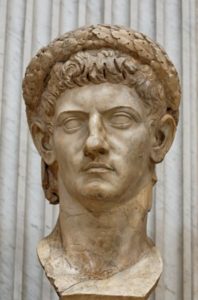Below is a detailed article about the Roman Invasion in Britain. The Romans entered Britain in 43 BC and thereafter began to invade Britain in the year 55 BC by the Roman Military General and politician Julius Caesar. Let us learn more about the expedition below. Read more Roman Britain History
Expeditions by Julius Caesar

The Romans have always targeted England, planned and carried out expeditions in the area. This is due to the abundant availability of resources in Great Britain.
The British territory was rich in land and had abundant forest cover and fertility. This was the foremost reason the Romans came to England. Other than that, the Romans were conquering many territories in Europe, North Africa, and the Middle East and after Julius Caesars attempt to invade England, they learned about more available resources in the country.
British was rich with metals such as lead, iron, silver, gold, and zinc which makes it a place for conducting trade and commerce. They also saw a lot of human resource in Britain that could be used for slavery which was a brutal yet common act in Rome and the Roman empire.
It is also believed that before the invasion attempt by Julius Caesar, the Romans were against the British for helping France as the Romans acquired France too. It was called ‘Gaul’ back then.
The entire idea of invading England came because the Romans wanted to prove themselves the strongest in the Northeastern Atlantic region. They were of the opinion that once England was taken down, many other conquests would become easy.
In the year 55 BC, Julius Caesar visited Britain and observed good and fertile soil cultivation. He also saw the dense population that could be used as slaves for the Roman empire. However, during 55BC the Romans did not have an army large enough to raise a conquest over Great Britain.
When was Britain invaded by the Romans
The Romans entered Britain some years before the birth of Christ, that is around 55 BC when Julius Caeser made his first attempt to invade Britain. However, it is also believed that some Romans came into Britain and settled in around 43 BC without any conquest or violence.

Julius Caeser made two failed attempts to invade Britain. However, the final and third invasion was successful. In the year 43 AD, the Roman emperor orders 4 different troops to invade Britain. In this expedition, the Romans capture Essex and Colchester along with the Catuvellauni tribe.
Influence of Emperor Claudius on Roman Invasion of Britain
As years passed by and Emperor Claudius of Rome, came to power in 44 AD. They felt ready to invade Britain. They began their march from Rome and entered Kent through the areas of Bologne. They set up camp at Richborough on the coast of Kent. He sent out many armies or legions to different areas to conquer different territories.
One of the foremost legions, set their camp in Fishbourne, near Chichester in Sussex. They further went on to Exeter where the main camp was set. One of the legions set their base at Colchester and a separate one at Leicester. The ninth legion set their camp at Longthorpe near Peterborough.

Emperor Claudius of Rome raised a strategic and highly well-planned propaganda against the British Kings. Out of all the kings that ruled Britain, eleven of them surrendered to Emperor Claudius and one of them – King Caracatus was easily defeated who flee to Wales.
He was still resistant of the Roman rule and joined the tribe of Brigantes and took a shield with them. However, the Queen of Brigantes betrayed him and sold him to the Romans. The Romans took Caracatus and his family to Rome as slaves.
The Romans went on to capture Wales but they were stopped by the massive Iceni tribe revolt. Their king was Prasatugus who died in 60 AD. He had signed a peace treaty with the Romans. After his death, his wife Boudicca decided to continue the peace in the kingdom by holding the treaty valid even after her husband’s death. However, the Romans were ruthless. They seized her property and raped her daughters. To get back at the Romans, Boudicca captured St Albans, London, and Colchester and burned the cities down along with her army tribal men and women.
After this, the Roman governor in London raised an even bigger army and wiped out the tribe completely. Boudicca escaped and poisoned herself as she did not want to die in the hands of the Romans. This battle is known as the Battle of Wattling street.
In the year 75 AD, the Romans began to build a palace in Fishbourne in Chichester in the United Kingdom. It was among the largest place of residence in Roman Britain. However, it was demolished in 270 AD. Between these three years, the Romans defeated the last remaining tribes of North Britain and conquered Britain entirely.
